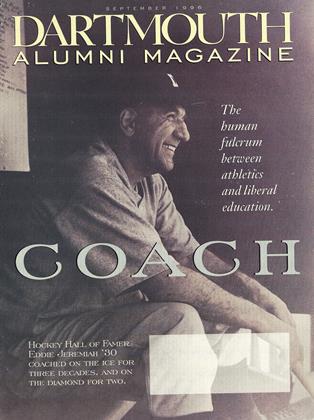"One of the most important words in the English is 'perhaps.'"
This month's Presidential Range is adapted from President Freedman's 1996 Commencement address.
Someone once asked Woodrow Wilson, when he was president of Princeton, what the function of a liberal education ought to be. Wilson replied, "To make a person as unlike one's father as possible."
What he meant, I think, was that liberal education ought to make a person independent of mind, skeptical of authority and received views, prepared to forge an identity for himself or herself, capable of becoming an individual not bent upon copying other people (even people as persuasive as one's parents).
The kind of liberal education to which Wilson referred is more necessary today than ever before because the qualities it nurtures are more imperiled than ever before. We are immersed in a kaleidoscopic culture of constant stimulation, significantly influenced by the mass media and other prescribers of opinion and feelings.
The omnipresence of television, telephones, fax machines, computers, the Internet, e-mail, and other forms of instant communication too often creates a bewildering barrage of noise and movement. It is almost as if we have surrounded ourselves with such technology precisely to avoid moments of silence and contemplation.
If we are to succeed in preserving our individuality, we must establish a rich and imaginative interior life and a sturdy openness ofmind. We need to maintain a private self so that we can resist the pressures toward conformity, convention, and banality that the cacophony of urgent voices creates.
But it is not just the omnipresence of the media and the compulsive urgency of the contemporary world that make the reflective temper of liberal education more essential than ever before.
Our society in general, and our political culture in particular, have descended into polarities and rigidities of thought that do not serve us well. They make social discourse and companionable community more awkward to sustain. They make consensus and compromise more difficult to achieve. They make us worse listeners than we ought to be. In short, they make us less thoughtful and less tolerant.
Liberal education urges upon us a reflectiveness, a tentativeness, a humility, an openness to other points of view, a desire to continue to learn throughout one's life, that can mitigate these tendencies toward polarity, rigidity, and intolerance.
This tentativeness this skepticism about certainty and conventional wisdomis an important characteristic of a refined mind and of a good citizen. Liberal education seeks to impress upon us all that one of the most important words in the English language is "perhaps," and that we would do better if we could discipline ourselves to preface some of our most emphatic statements with that critical word.
Liberal education teaches the importance of tempering profound convictions with a measure of tolerance and a judicious sense of humility. And it may even sustain us as we negotiate the paradox of being persons of deeply held commitments who can, in the same metaphysical moment, still imagine the possibility that we are wrong.
Liberal education is surely not a panacea for all of our personal or social dilemmas. It is no guarantee of goodness, as the occurrence of the Holocaust in one of the most cultivated nations in Europe—the nation of Goethe and Schiller and Mannreminds us. Nor does it protect us from our most foolish emotions. But at its best, liberal education does have the redemptive potential to prepare us for both the glories and exhilarations of life as well as for its ironies and perplexities.
I hope that the liberal education students receive here will enable them to see the world clearly and steadily and to be conscious of the desirability of qualifying what they say with the word "perhaps." I hope, too, that it will encourage them to lead the examined life of an idealist.
 View Full Issue
View Full Issue
More From This Issue
-
 Feature
FeatureThe Language of Innocence
September 1996 By KATE COHEN '92 -
 Cover Story
Cover StoryBAKER WAS THE BACKDROP
September 1996 -
 Feature
FeatureStaying Clear
September 1996 By Jeanet Hardigg Irwin '80 -
 Feature
FeaturePassion
September 1996 By Fiona Bayly '89 -
 Feature
FeatureConfidence
September 1996 By Paid Tsongas '62 -
 Feature
FeatureFaith
September 1996 By Seward, "Pat" Brewster '50
James O. Freedman
-
 Article
ArticleTHE CONCEPT OF HEROISM
MAY 1991 By James O. Freedman -
 Article
ArticleCompared to What
June 1992 By JAMES O. FREEDMAN -
 Article
ArticleWhen Knowledge Cures
October 1995 By James O. Freedman -
 Article
ArticleThe Liberating Arts
MAY 1996 By James O. Freedman -
 Article
ArticleLibraries Unbound
JANUARY 1998 By James O. Freedman -
 Article
ArticleInfluential Minds
May 1998 By James O. Freedman







